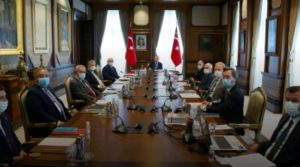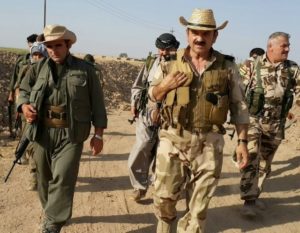
Stanislav Tarasov – Erdogan is led face to face with the Armenian Genocide
June 26, 2020 – REGNUM:

annotation
The emergence in Turkey of an independent structure to combat the recognition of the Armenian Genocide can be considered serious only if professional, scientifically conscientious specialists begin to work in its structure. Moreover, there are a lot of gaps in this issue.
In Turkey, an event occurred that outwardly was not motivated by anything. Turkish President Recep Tayyip Erdogan at the next meeting of the Supreme Advisory Committee (WCC), which lasted as long as five hours, ordered the creation of an independent structure to combat the recognition of the Armenian Genocide. The Turkish newspaper Hurriyet reports that one of the members of the CWC, Cemil Cicek, made this idea and read a special report.
It noted that recently the “Armenian lobby” has ceased to transmit genocide applications to international courts due to the probability of refusal to consider due to the wording. It is indicated that lobbyists are trying to replace and introduce into the general discourse in relation to the events of 1915, instead of the term “genocide,” the concept of “crime against humanity in the Ottoman Empire.”
It is argued that the development of a strategy to build a unified policy on the denial of the Armenian Genocide is mainly associated with the appearance in the US Congress of a resolution recognizing the Armenian Genocide. But it was adopted by American lawmakers at the end of October last year.
Similar resolutions have been considered in Congress for a long time, but have never before been voted on at such a high level. Its acceptance was lobbied by the two largest groups representing Americans of Armenian descent – the Armenian National Committee of America (ANCA) and the Armenian Assembly of America (AAA).

According to many experts, the passage of the resolution (405 members voted in favor, 11 opposed) was facilitated by the conflict that arose between Washington and Ankara over the Turkish operation in northern Syria. If Turkey then responded by declaring the creation of an independent structure to combat the recognition of the Armenian Genocide, this would fit into the context of the events. What did not happen. All this suggests that Erdogan’s actions began to be dictated by circumstances that were important to him, coming from outside.
And what? Modern Turkey does not physically feel the factor of the “Armenian issue” (its relationship with Yerevan is another matter). It is introduced into the regional geopolitical context through the Kurdish factor. Genocide is no longer perceived solely as a problem of a moral level. Previously, Ankara understood that the US position on the Genocide issue was determined by geopolitics. Washington did not want to spoil relations with Turkey, a key partner in NATO.
American presidents, including Donald Trump, called the 1915 events in the Ottoman Empire “a great crime”, but avoided using the word “genocide”. However, what will happen next when the USA is experiencing great upheaval and shaking because of historical research? As the Turkish edition of Milliyet warns, “Ankara should be ready for the wave of iconoclasm coming from the USA.”
Star gazete, in turn, predicts that the Armenian Genocide factor “will take on a special meaning when the Western world recognizes that it itself committed genocide in Africa and Asia.” Let us recall, for example, that at the end of last year, French President Emmanuel Macron, while on a visit to Côte d’Ivoire, declared that “colonialism was a great mistake of France” and called for “opening a new page in the common history”. As for Ankara, according to Western and Turkish experts, “Turkey has lost the Kurdish question,” having lost credibility primarily in the eyes of its allies.
The task of future historians is to find out why Erdogan’s policy, often referred to as zero-sum (antagonistic game), with regard to Iraqi and Syrian Kurds has more and more introduced this problem into the sphere of big politics. The first paradox is that Ankara, which has long opposed any Kurdish entity, at one time encouraged Erbil’s separatist aspirations in Iraq.
The second paradox: at one time, US Secretary of State Hillary Clinton, one of the architects of the signing of the well-known Zurich protocols on normalizing relations between the two countries between Turkey and Armenia in October 2009, made no secret of the fact that he considers the Nagorno-Karabakh conflict complex and does not consider Armenia in the context of its cooperation with Russia, but rather in terms of strengthening the Armenian factor as an element of deterring Turkey, and not only in the Transcaucasian direction. Experts even then stated that the actualized Kurdish problem in the Middle East would drag out the “Armenian issue”, the solution of which is associated not only with Yerevan.
This is exactly what is happening right now. And a broad geopolitical background: Iraqi Kurdistan, leading a foreign policy virtually independent of Baghdad, two Armenian states in Transcaucasia – Armenia and NKR. Moreover, the West began to openly associate the possibility of solving the Kurdish problem for Turkey with the democratization of the country, just as the democratization of Azerbaijan is set as the basic condition for the settlement of the Nagorno-Karabakh conflict.
Since Ankara does not make concessions on the “Kurdish issue”, the armed struggle of the Kurdistan Workers’ Party leaves no hope for any solution. As in Nagorno-Karabakh, where everything is balanced on the verge of war and peace. It may seem to some that we are pulling Erbil, Yerevan and Stepanakert into one knot, but Western, Russian and Armenian Kurdish experts have long been studying this problem in this perspective. Everyone understands that independence in the region through the efforts of the Democratic Union (PYD – the leftist party of the Syrian Kurds) leads to the strengthening of the PKK in Turkey.

Not today, so tomorrow such autonomy / independence may become even more likely. Turkey’s cross-border military operations exacerbate the situation. Of course, on the whole, the creation by Ankara of an independent structure to fight against the recognition of the Armenian Genocide can be considered serious. But only if it includes professional, scientifically conscientious specialists. Moreover, there are a lot of gaps in this issue. So, earlier in Turkish historiography the point of view dominated, according to which “only Europe and Russia infected the separatism of Turkish Armenians.”
But the well-known Turkish scientist Seyit Sertchelik, who has been researching the “Armenian issue” for a long time, believes that “the Armenian issue begins with the emergence of the hamsa system – the reign of Armenian meliks in Persian auspices and the projection of creating an independent Armenian state on Anatolian lands in 1678, with the advent of the class of the Armenian bourgeoisie, which was engaged in trade along the Silk Road. ”
Another Turkish historian, Taner Akçam, who published a new book on the organization of the Ottoman state by the supreme authorities of the Armenian Genocide in 1915, is sure that Ankara, in its current political condition, will not change the rhetoric on the Armenian issue. She will never refuse to deny the Armenian Genocide because “this ideology has deep roots in the state apparatus of the country”.
We will not be so categorical, the world, the Middle East and Turkey are noticeably changing. Well-known American political scientist Daniel Pipes writes in an article for The National Interest that “Ankara will be forced to significantly change its foreign policy course if it does not want to become the second Iran for the United States, under the influence of changes in Washington.” We’ll see.
June 26, 2020
Stanislav Tarasov
REGNUM
English translation – LOUSAVOR AVEDIS:
